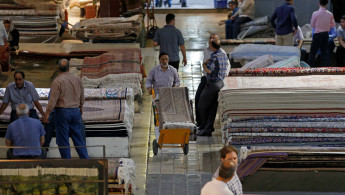Unease, anger in Tehran's Grand Bazaar hints at return of protests
The thousands of shops in Tehran's sprawling Grand Bazaar have long been a gauge of the national mood in Iran. Its current gloom, as American sanctions begin to choke the economy, may be a sign that even more disruptive unrest among the disgruntled population is on its way.
Amid the collapse of Iran's rial currency, once comfortably-off Iranians are struggling to afford basic goods in the market. Vendors are vocal against the government, internal politics and corruption, blaming them for the country's woes.
The vocal discontent among Iran's lower and middle classes - who make up the vast majority of its population - shows the dangers ahead for the government of the relatively moderate President Hassan Rouhani. His signature nuclear deal with world powers now has become a noose around his neck that hard-liners gleefully tighten.
Meanwhile, the sporadic and leaderless protests the nation has seen over its worsening economy threaten to roar back to life at any time. That has many expecting the worst is yet to come.
"It has become more difficult, but we need to lower our expectations," Kiana Ismaili, 26, told AP as she shopped ahead of her wedding.
For centuries, Iran's bazaar has been the beating heart of both its economic and political life. While some now go to the Western-style mega-malls of Tehran's smart northern suburbs, the Grand Bazaar's narrow alleys, cramped stalls and wandering musicians still draw crowds of thousands.
 |
You have no price stability in this country. You go to bed and overnight a car that was worth 100 million rials is now worth 140 million |  |
Strikes in Iran's bazaar also have served as political bellwethers.
Bazaar families opposed the Iranian Shah Mohammad Reza Pahlavi and supported the 1979 Islamic Revolution that saw him replaced by the Shia theocracy and elected officials. More recently in June, protesters swarmed Tehran's Grand Bazaar and forced shopkeepers to close their stalls, apparently in anger over the rial dropping to 90,000 to the US dollar on the black market despite government attempts to control the currency rate.
 |
|
| Shopkeepers in the Grand Bazaar went on strike earlier this year when the rial went into freefall [Getty] |
The rial in the meantime has dropped as much as 150,000 to $1 with many anticipating further drops as the US revives punishing sanctions on Iran's crucial oil industry in early November.
The Trump administration denies it is seeking to overthrow Iran's government through the economic pressure, though Iranian officials say the link between the two is clear.
Fear over the economy has brought many to the Grand Bazaar in recent days to buy what they can before their savings further dwindle away.
"You have no price stability in this country. You go to bed and overnight a car that was worth 100 million rials is now worth 140 million," said Omid Farhadi, a 25-year-old sales clerk at a kitchenware shop in the Bazaar.
Farhadi said other young Iranians with the financial means want to leave the country, while those without, longingly look at life in Europe.
Farhadi largely blamed Iran's poor relations with the rest of the world for the faltering economy.
The financial woes were spearheaded by President Donald Trump's decision to pull America out of the 2015 Iran nuclear deal, which saw Iran agree to limit its enrichment of uranium in exchange for the lifting of economic sanctions.
While the United Nations repeatedly has said Iran complies with the accord, Trump said he wanted a stricter deal that also constrained Iran's ballistic missile program and its foreign policy while permanently limiting its atomic program.
But while Iranians remain angry at Trump over adding them to his travel ban and pulling out of the deal, many feel even angrier at their own government following a steady stream of corruption cases and allegations of mismanagement by officials. On top of high unemployment, growing inflation and debt-laden banks, resentment has also been targeted toward Rouhani's administration.
"Ninety percent of our problems are because of the infighting," said salesman Alireza Alihosseini. "I don't know why but the government and the supreme leader have differences. Only 10 to 5 percent is because of America."
Iran's costly foreign intervention in Syria is also a sore point for young unemployed Iranians struggling to put food on the table.
"This is the people's money," said on man. "We have done nothing wrong to deserve this, but they are sending all our money to Syria."
Agencies contributed to this report.





 Follow the Middle East's top stories in English at The New Arab on Google News
Follow the Middle East's top stories in English at The New Arab on Google News


